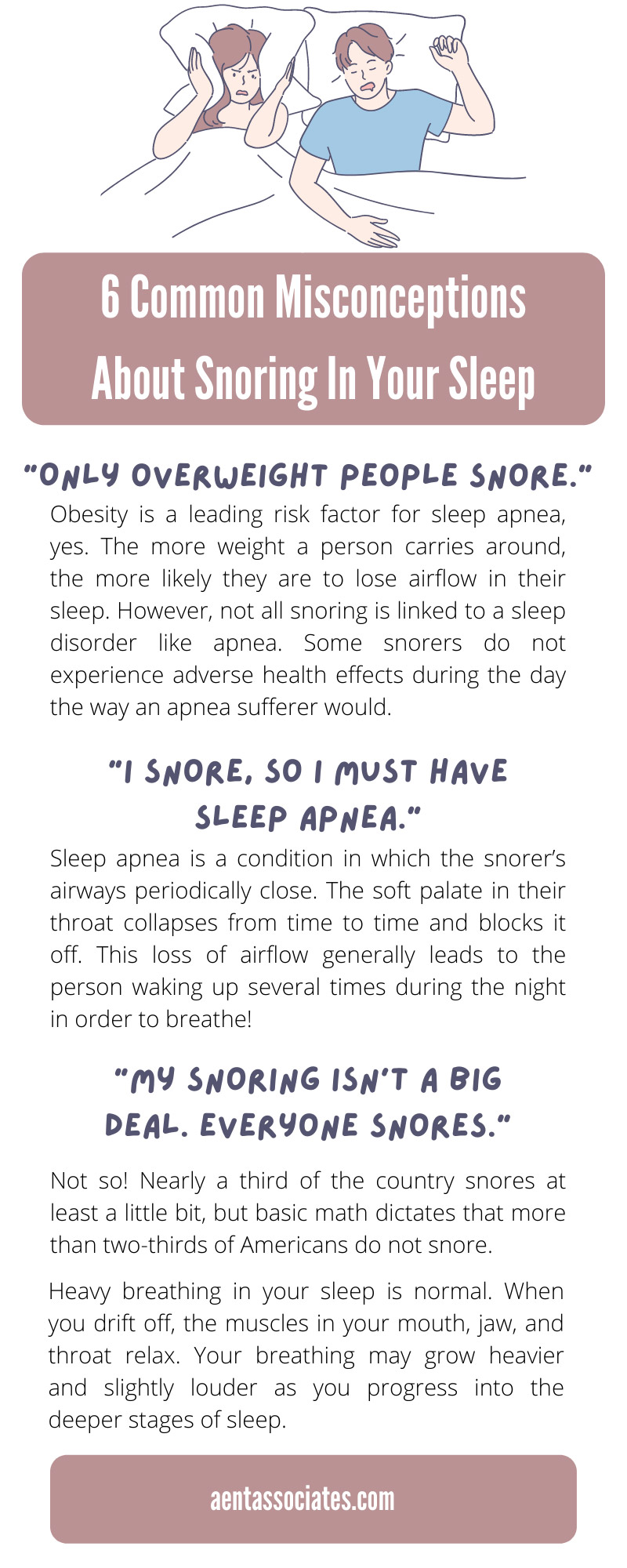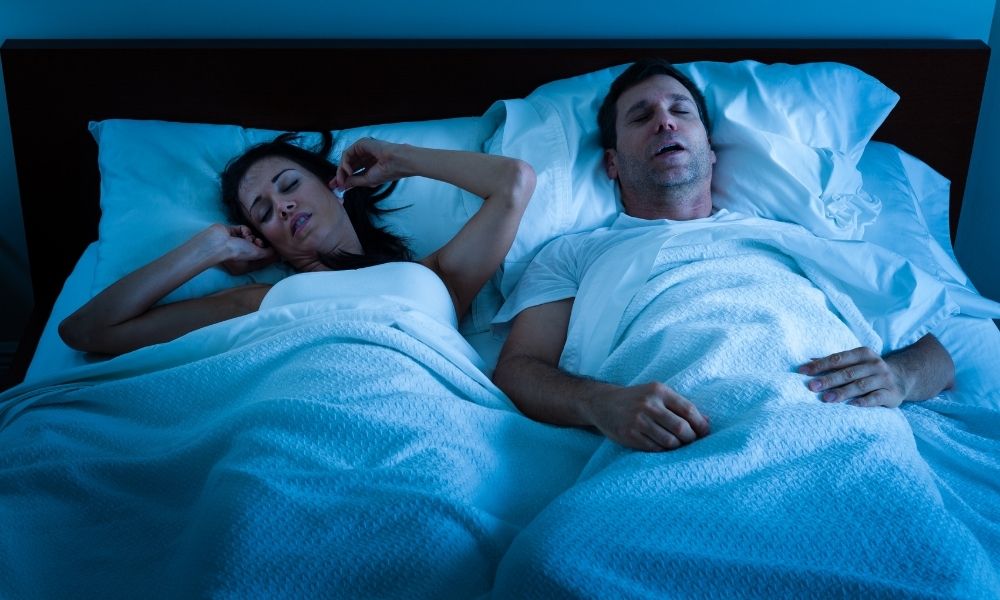Are you one of the many people in this country who snores in their sleep? Perhaps a sleeping partner or other loved one has mentioned it to you. Whether you snore softly or really saw logs in your sleep, it may indicate a deeper health concern. Fear not, though—you’ve got plenty of resources on your side with a snoring specialist near you.
As you wait for your appointment, let’s look at a few common misconceptions about snoring in your sleep. Nearly a third of this country snores, many of whom may not know the real scoop about their affliction. Knowledge is power, especially in a doctor’s office!
“Only overweight people snore.”
While weight gain can be linked to increased snoring, the affliction itself does not discriminate. No matter what size you are, if you snore, it’s time to get it checked out.
Obesity is a leading risk factor for sleep apnea, yes. The more weight a person carries around, the more likely they are to lose airflow in their sleep. However, not all snoring is linked to a sleep disorder like apnea. Some snorers do not experience adverse health effects during the day the way an apnea sufferer would.
Not all overweight people snore, and snoring (including sleep apnea) can affect people of any size. Don’t discount the possibility of a sleep disorder, even if you are not overweight. Sleep apnea does not discriminate by size, age, or gender.
“I snore, so I must have sleep apnea.”
Sleep apnea is a condition in which the snorer’s airways periodically close. The soft palate in their throat collapses from time to time and blocks it off. This loss of airflow generally leads to the person waking up several times during the night in order to breathe!
This myth, like the one above, has some basis in truth. Loud snorers are more likely to have obstructive sleep apnea, but rest assured that the vast majority of snorers do not suffer from sleep apnea. If you’re unsure of whether you have this condition, contact a snoring clinic in Houston and try a sleep study. Our specialists know how to detect an apnea episode and can help you with treatment options if needed.
“Sleep apnea is a men’s disease.”
Apnea does not care about your gender! However, much like dozens of other conditions, it presents differently in women.
Men are often stereotyped as being loud snorers—while they are more likely to snore, women often do so as well. Due to even more gender stereotypes, though, people don’t like to think about women snoring and often don’t check it out. Female snorers are surrounded by stigma based on an “unattractive” condition. Men are diagnosed with sleep apnea eight times more than women are, but that doesn’t necessarily mean it’s only a men’s disease. In fact, it indicates that women aren’t getting checked out as much and are being underdiagnosed.
An apnea episode is defined by periods of silence in the snoring; that’s a sign the airway is obstructed and the person can’t breathe. Men are more likely to experience a total collapse of their soft palate and a total airway obstruction a few times during the night. Meanwhile, women often experience more frequent, but only partial, airway obstructions.
Regardless of your gender, if you feel tired and restless during the day and can’t seem to get an uninterrupted night’s sleep, sign up for a sleep study. A sleep specialist will listen closely to your snoring and identify any abnormalities.
“Kids are too young for sleep apnea.”
As previously stated, sleep disorders can affect anybody, regardless of age or other factors. There’s no such thing as “too young” for snoring and associated conditions. Some children do snore! Up to four percent of children suffer from sleep apnea.
A common culprit for sleep apnea in children is their adenoids. Those glands in the back of their throats will disappear as they reach adulthood, but in the meantime, they can obstruct airflow during sleep. Pediatricians sometimes recommend that they be removed if they’re causing obstructed airways and even chronic ear infections.
In addition, more and more research suggests that attention deficit disorder in children can be linked to fragmented sleep and apnea symptoms.
“My snoring isn’t a big deal. Everyone snores.”
Not so! Nearly a third of the country snores at least a little bit, but basic math dictates that more than two-thirds of Americans do not snore.
Heavy breathing in your sleep is normal. When you drift off, the muscles in your mouth, jaw, and throat relax. Your breathing may grow heavier and slightly louder as you progress into the deeper stages of sleep. However, ragged breathing and gasping during the night can indicate a deeper problem. If your own snoring wakes you up in the middle of the night, talk to a doctor about it. Disrupted sleep caused by snoring can lead to difficulty concentrating and feelings of listlessness during the day.
(Not to mention, if you have a regular sleeping partner, your snoring could be affecting the quality of their sleep as well. Don’t let your snoring become somebody else’s problem! It may not seem like a big deal to you, but consider the well-being of those around you.)
“Trust me—I’d know if I had sleep apnea.”
Many apnea sufferers do notice when they wake up in the middle of the night to gasp for air. If their airway is completely obstructed, they’ll need to wake up to breathe.
However, sleep apnea does not present the same in everybody. Your body will need to wake from sleep to get air flowing again, but it’s not real wakefulness; you’re just barely below the threshold for conscious recognition. You could wake up a dozen times in the night to breathe, then get up in the morning thinking you’ve had a full night’s sleep.
It’s impossible to diagnose yourself with sleep apnea, because you could be losing airflow in the night while not conscious enough to recognize it. If you have a regular sleeping partner, they may be disturbed by those episodes; ask them what your snoring sounds like. Even if you’re not gasping for air all night, your snoring may indicate a deeper problem.
If you think your snoring is no big deal, think again. Sleep disorders don’t discriminate based on your weight, age, or gender. Even if you don’t think you’re at risk, consider seeing a sleep specialist if you find yourself tired, restless, and inattentive during the day. While not all snoring is linked to serious sleep disorders, it’s still a medical condition that needs attention. Educate yourself and remember these common misconceptions about snoring in your sleep as you make an appointment at Allergy & ENT Associates.


